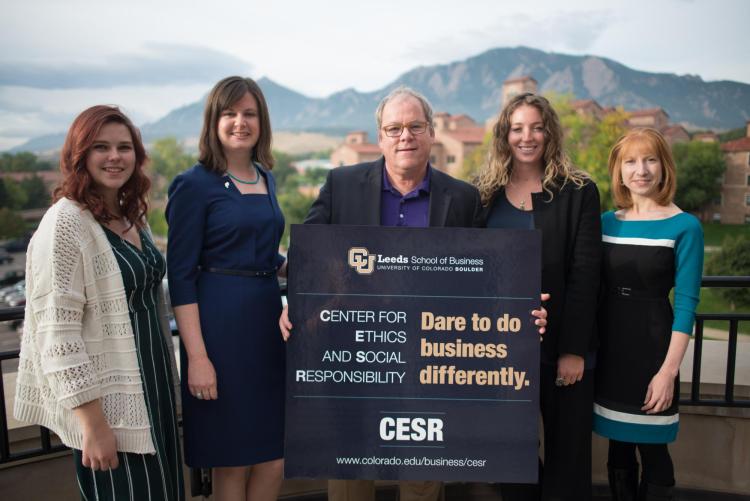
Many businesses and private organizations wonder how to act on the United Nations’ Sustainable Development Goals (SDGs), but aren’t sure how to take action, or how their sustainability efforts stack up. This summer, a team from the Center for Ethics and Social Responsibility (CESR) embarked on a research project with B Lab to support a new management tool that will make it much easier for businesses and organizations to move the needle on the SDGs.
Since early summer, CESR has been hard at work contributing research and analysis to evaluate where B Lab’s sustainable business management tool - the B Impact Assessment (BIA) maps to the SDGs, and how the tool could evolve to fill in the gaps between the two sets of metrics. After CESR completes our analysis, B Lab will incorporate our findings and recommendations into the development of a new tool for businesses to measure impact on the SDGs.
Chosen as a project partner by B Lab because of our close work with UN PRME, CESR welcomes this opportunity to improve our own experience with the SDGs, as well as the unique challenge of pairing business actions with social and environmental outcomes.
The B Impact Assessment
 B Lab is a driving force behind the movement to use business as a force for good. As a global nonprofit, B Lab certifies and promotes Certified B Corporations (B Corps), companies that meet the highest standards of verified social and environmental performance, public transparency, and legal accountability to balance profit and purpose.
B Lab is a driving force behind the movement to use business as a force for good. As a global nonprofit, B Lab certifies and promotes Certified B Corporations (B Corps), companies that meet the highest standards of verified social and environmental performance, public transparency, and legal accountability to balance profit and purpose.
The B Impact Assessment (BIA) was designed to assess how companies perform against hundreds of best practices in order to provide an understanding of where they fall in the many dimensions of sustainability. When a company completes the B Impact Assessment, they receive questions tailored specifically to the size, sector, and geography of that company. Each impact area- governance, workers, community, customers, and environment- filters the user through questions about their business operations and ultimately provides each category with a score comparable to the average of all other businesses that have completed the assessment.
The process doesn’t end after the company receives their scores, but continues with improvement reports, best practice guides, and improvement case studies. Even if the company does not receive a score of 80- the minimum score that considers a company B Corp Certified- they have access to these free tools that assist companies in improving their impact. More than a certification, the B Impact Assessment is a management tool for building business with a positive social and environmental impact. To learn more about the B Impact Assessment and the B Corp Revolution, visit B Lab’s website.
 The Sustainable Development Goals
The Sustainable Development Goals
The Sustainable Development Goals are a part of the 2030 Agenda for Sustainable Development. In this agenda, the UN identifies that transformative steps are a requirement for sustainable development, and declares our collective journey to achieve the 17 goals and 169 targets.
Covering a wide range of topics such as poverty, education, gender equality, sustainable and inclusive economic growth, climate change, and peaceful and inclusive societies, the SDGs promote global solidarity and collaboration to move societies forward without leaving anyone behind. To learn more about the Sustainable Development Goals, visit the UN’s website.
SDG Mapping
In the process of integrating the B Impact Assessment with the SDGs, we use a few key factors to map SDG targets and indicators to related BIA questions. We start by considering the various impact areas that the assessment touches upon. When mapping the ‘environmental’ section of the BIA, for example, common themes such as waste reduction or water usage must be related to the SDGs such as #6: Clean Water and Sanitation or #12: Responsible Consumption and Production. Although each BIA question commonly relates to multiple SDGs, each impact area finds similarly related SDG Targets.
Then, we narrow the focus to understand which businesses will encounter a certain question. Many questions apply to different sectors, sizes, and markets, but the BIA filters questions through their complex database to ask each business only the essential questions. For this reason, we must understand who will be seeing each question, and how their answers indicate practices that impact the SDGs.
Lastly, we must determine what each question is truly trying to find out. A very deliberate assessment, the BIA wastes no time asking questions that don’t have a sure purpose that fits into their overall goal. If we can understand what the company’s answer choice indicates to B Lab, CESR can map the question in alignment with SDG Targets.
Why
This work is important because of the way that it can help businesses improve their impact. The B Impact Assessment is already a strong management tool that covers a wide range of business activities, but when paired with the SDGs, it will provide invaluable information about the larger impact of a business. A previously daunting set of metrics with little practical business application, the Sustainable Development Goals will be increasingly accessible through this tool.
Kimberly Kosmenko, owner and managing director of Kosmenko & Co. (a impact business consulting and training firm that is also a B Corp) and a leader in the B Corp business community, is contributing as Project Director for this effort. Kimberly says, “Many businesses and NGOs find the breadth and magnitude of the SDGs daunting, and hold back from acting on them. This project helps to change that by bringing together the UN’s global vision with B Lab’s well honed management tool for ethical, sustainable business.”


